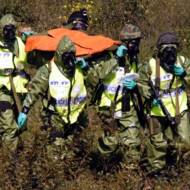
Hezbollah has chemical weapons, supplied by Iran and Syria, a former Syrian general warned.
By: The Tower
The general who formerly headed Syria’s chemical weapons program before defecting in 2013 said that Iran’s proxy Hezbollah has a store of chemical weapons and that Iran itself is testing missiles with chemical warheads, The Jerusalem Post reported Thursday.
General Sha’arq Zuhair al-Saqit, who defected from Syria when ordered to deploy chemical weapons against civilians and now heads the Center for the Detection and Monitoring of the Use of Chemical Weapons in Belgium, said that Hezbollah received most of the chemical weapons from Syria, when the regime of Bashar al-Assad was trying to conceal the weapons from international monitors following the gas attack in East Ghouta in August 2013.
The possession of “game-changing” weapons, including chemical weapons, by Hezbollah is one of the “red lines” Israel has declared that it would not allow.
He also said that Iran has been testing short and medium range missiles, with ranges of 5 to 25 kilometers (3 to 15 miles), with chemical warheads in Syria.
Al-Saqit also said that Iran is a major supplier of chemical weapons to Syria.
The general was in Paris where he warned that Syria was still using chemical weapons. In an interview, he said that “the Syrian army and the militias supporting it carry out daily attacks on the population, which uses chlorine gas. Only yesterday there was such an attack.”
The center he heads collects testimonies from people on the ground in Syria.
Al-Saqit agreed with a recent United Nations report that confirmed that North Korea was sending equipment for developing chemical weapons to Syria.
In an interview last year, al-Saqit said that Assad had not declared his entire stockpile of chemical weapons and had retained several hundred tons of the proscribed weapons.

Subscribe to Our FREE Newsletter for More Great Stories Like This One
United with Israel publishes stories like this every day. We believe that our work allows a more balanced view of Israel to emerge. With so much anti-Israel media bias out there from outlets like CNN and the BBC, helping the Holy Land means getting our message out to as many people as possible.
You can help.
Subscribe to our free newsletter to ensure that you get the latest and best stories from United with Israel. Together we can make a difference, and it starts with communication.
Source: United with Israel
